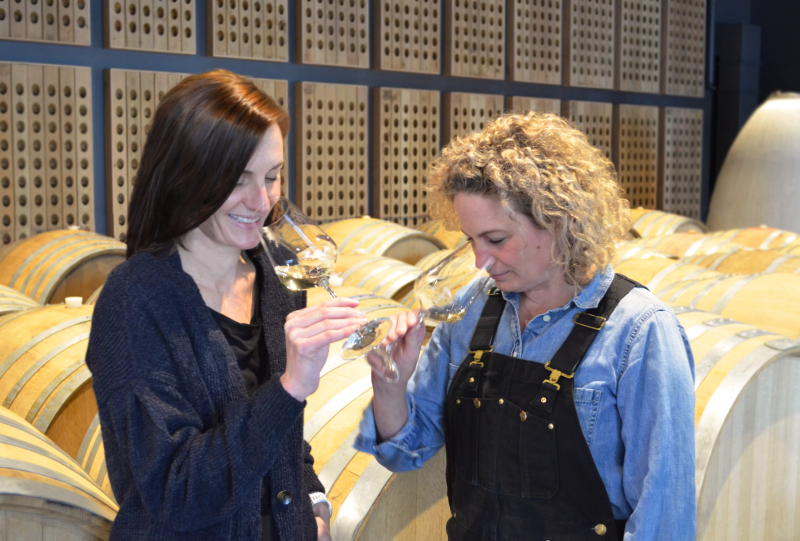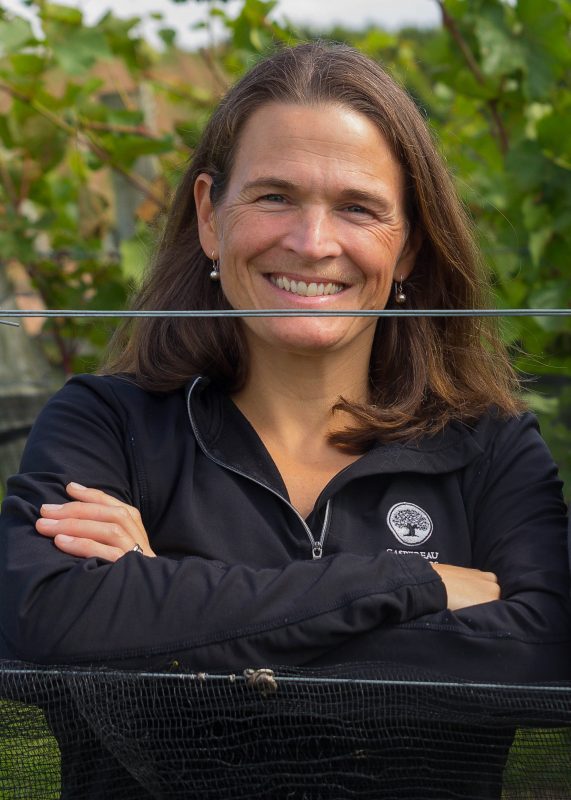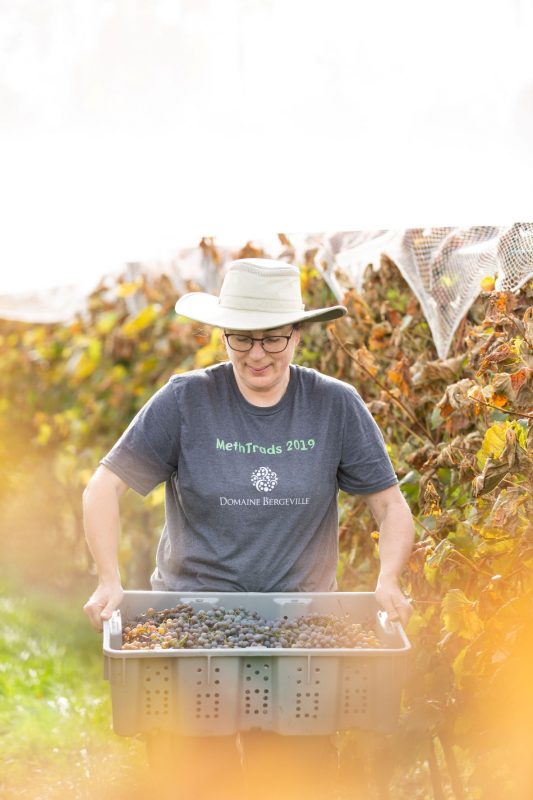Part 4
In celebration of International Women’s Day 2022, this is the fourth and final installment of this particular series on women in the wine industry.
While Nova Scotia and Quebec both claim to have the oldest wine industries in Canada (French settler Louis Hebert planting a small vineyard near Bear River in Nova Scotia in 1611 and Samuel de Champlain’s unsuccessful plantings of vinifera around the same time in Quebec), the modern day wine industries in each province dates back less than fifty years.
Quebec and Nova Scotia are smaller than British Columbia and Ontario in terms of acreage and production, with 137 wineries in Quebec and just over twenty in Nova Scotia. However, similar to their sisters in central and western Canada, there are a number of trailblazing women who have been integral to the growth and success of the industries in both provinces.
Nova Scotia
Suzanne Corkum: Sainte-Famille Wines
Suzanne Corkum is a Nova Scotia wine industry pioneer. Originally from Oregon, she and her family started hand-planting grapes in 1979 and opened Sainte-Famille Wines in 1990. The winery grew from ten to 25 acres and is home to some the province’s oldest vineyards. Although Sainte-Famille initially had a winemaker, after a harvest at Vineland Estates in Niagara, Corkum started making wine herself and became Nova Scotia’s first female winemaker. She continued to make wine and ran the winery with her late husband Doug until Nova Scotia Spirits purchased the winery last year.
Ashley McConnell–Gordon and Devon McConnell-Gordon: Benjamin Bridge
Well known within Canada and internationally for producing some of Canada’s top sparkling wines, the twin sisters running the show at Benjamin Bridge are perhaps less known outside of wine industry circles. Gerry McConnell and Daria Gordon started Benjamin Bridge in the late 1990s, with daughters Ashley McConnell-Gordon and Devon McConnell-Gordon clearing the first vineyard land during their summer breaks. After studies in architecture (Devon) and law (Ashley), they returned full time to the winery in 2009 just as head winemaker Jean-Benoit Deslauriers and the BB team, led by their mother Daria who was in the final stages of the cancer that took her life, were preparing for the inaugural sparkling release of their 2004 cuvees.
Devon is the VP of Design and Marketing while Ashley is VP of Operations and General Manager: both have greatly contributed to the quality and design aesthetic of Benjamin Bridge. The McConnell-Gordons describe the Nova Scotia wine industry as “welcoming and supportive to them as young women entering the business, instead seeing the greater challenge as being part of a then little-known wine industry that was trying to disrupt preconceived notions about grape growing and winemaking”.
While the senior management team at Benjamin Bridge has always been at least 75% women, the McConnell-Gordons are aware of the gender division of labour in marketing, and hospitality and

under-represented in winemaking, viticulture, and accounting. Today, they are proud that 85% of the team across the business, including head viticulturist, field quality manager, assistant winemaker and the accounting team identifies as female. They also recognize the wine industry is very traditional in how it is structured and measures work performance, due to the demanding and intense periods of work during harvest and bottling. They are committed to identifying and valuing the other parts of the wine growing cycle that not only support women but also lead to greater diversity in senior, decision-making roles by allowing more flexible yet highly productive work, as opposed to only measuring the number of hours put in.
Gina Haverstock: Devonian Coast Wineries
Gina Haverstock started working in the Nova Scotia wine industry with a summer job at Jost Vineyards in 2000. This led her to become more interested in wine than studying for her medical school entrance exams, which in-turn led her to becoming a certified sommelier through CAPS Atlantic Canada followed by obtaining a BSc in winemaking from Brock University’s Cool Climate Oenology and Viticulture Institute (CCOVI). Haverstock worked harvests around the world but always knew she wanted to make wine in Nova Scotia. She became the winemaker at Gaspereau Vineyards in 2006 and, since 2018, is head winemaker at Devonian Coast Wineries, Nova Scotia’s largest winery group where she oversees wine making at Jost, Gaspereau and Mercator Vineyards.
Haverstock cites many strong female role models in both her work abroad as well as female colleagues at CCOVI, like Emma Garner of Thirty Bench Wines and Lydia Tomek of Ravine Vineyard Estate Winery, as well as Professor Debbie Inglis, who is the director of CCOVI and a grape grower herself. Suzanne Corkum and Ann Sperling (of Southbrook and Sperling Vineyards) who was consulting in Nova Scotia when Haverstock started in the industry, showed Haverstock that women hold influential roles in the Nova Scotia industry and shaped her idea of what a successful career in wine could look like.
Haverstock believes it is vital to have women in decision-making positions and on industry boards to show women the wine industry is a viable employment option. She also thinks women need to prepare themselves with the managerial and human resources skills required to successfully advance into management and leadership positions.
The Nova Scotia industry has come a long way in many respects and Haverstock considers herself lucky to be in the company of many influential female colleagues. She points to Rachel and Kori Lightfoot and assistant winemaker Cat Taylor at Lightfoot and

Wolfville, which is co-owned by Jocelyne Lightfoot. As well as winemakers Becca Griffin of Mercator Vineyards and is co-owned by Jocelyne Lightfoot. As well as winemakers Becca Griffin of Mercator Vineyards and Andrea Burbidge of Gaspereau Vineyards; Geena Luckett, co-owner of Luckett Vineyards and Kim Gorman, assistant winemaker at Domaine de Grand Pre.
There are also other women, like co-owner Avila Coutinho of Avondale Sky, Susan Wong of Bear River Vineyards, Pauline Scott of L’Acadie Vineyards, Lisa Law of Planters Ridge, Amber Eikelenboom of 1365 Church Vineyard and Winery and Barbara Thomson of Petite Riviere Vineyards that are contributing to the growth and success of the Nova Scotia wine industry.
Quebec
The Quebec wine industry has a growing number of women in ownership and leadership positions, both among older, established wineries, as well as among those that have opened in the past two decades.
Eve Rainville: Domaine Bergeville
Domaine Bergeville is one of Quebec’s newer wineries that specializes in making some wonderful traditional method organic sparkling wines from hybrid grape varieties. It is co-owned by Eve Rainville and her spouse Marc Théberge, who were both initially involved in all aspects of viticulture and winemaking. As the winery grew in size and production, Rainville now concentrates her time as COO and CFO while Théberge is CEO and CIO.
The name Bergeville is a combination of their two family names to express their mutual dream of making quality wines from their own grapes. They made wine with Théberge’s family from purchased grapes for many years and after completing master’s degrees in engineering and statistics at UBC, living, working abroad, and visiting many wine regions, Rainville and Théberge decided to leave their day jobs and become winegrowers. They chose Quebec for environmental, financial and personal reasons. Vines were planted at Domaine Bergeville in 2009, with the first harvest in 2012 and first release of sparkling wines in 2014. Their 7.5-acre vineyard produces 3,000 cases of sparkling wine annually and with a recent purchase of 27 additional acres, have plans to expand over the next 10 years.
Rainville believes “the Quebec wine industry makes room for women like few wine industries in the world do”, referring to the presence of numerous internationally known female sommeliers and writers (Véronique Rivest, Emily Campeau, Nadia Fournier to name but a few), as well as the growing presence of women in both vineyard and cellar, and in ownership and co-ownership positions.
Rainville also acknowledges that owning and running a vineyard and winery is above all else farming and a 365-day a year, 24 hour a day job, which, like many farms, necessitate sharing the work load among couples in addition to added support from extended family and friends. As a result, she wonders if younger women view the Quebec wine industry as a fulfilling line of work, if it can attract women with aspirations of senior management and if there are

sufficient mentoring opportunities. For her part, the main reason Rainville gets out of bed every morning is because she sees “her involvement at Domaine Bergeville as helping to create a better life and future for her, the land, her employees and their families, and in a small way, to help Quebec become self-sufficient”.
To learn about more women in the Quebec wine industry, check out the following wineries that are owned or co-owned and/or have women at the helm of winemaking or viticulture.
Les Bacchantes; Le Bourg des Cèdres; Le Chat Botté; Clos Sainte-Thècle; Domaine de L’Ardennais; Domaine Bel-Chas; Domaine Bergeville; Domaine Des Duc; Domaine des Feux Follets; Domaine le Grand Saint Charles; Domaine des Météores; Domaine du Nival; Domaine Oak Hill; Domaine St-Jacques; Domaine des 3 fûts; Domaines des 3 Moulins; Au Jardin D’Emmanuel; Maison Agricole Joy Hill; Le Mas des Patriotes; Les Négondos; Pigeon Hill; Pinard et Filles; Les Sœurs Racines; Vignoble 1292; Vignoble Caron; Vignoble Cortellino; Vignoble Les Côtes du Gavet; Vignoble Côte des Limousins; Vignoble Léon Courville; Vignoble les Murmures; Vignoble les Petits Cailloux; Vignoble d’Oka; Vignoble de L’Orpailleur; Vignoble Les Pervenches; Vignobles Prémont; Vignoble du Ruisseau; Vignoble Saint-Gabriel; Vignoble Saint-Thomas; Vignoble Sainte-Petronille; Vignoble les Vents d’Ange
Janet Dorozynski left life as an academic and has been tasting, judging, teaching & communicating about wine, beer and spirits from across Canada and the world for more than twenty years. She holds the WSET Diploma, a PhD from Concordia University and is a WSET Certified Educator.
